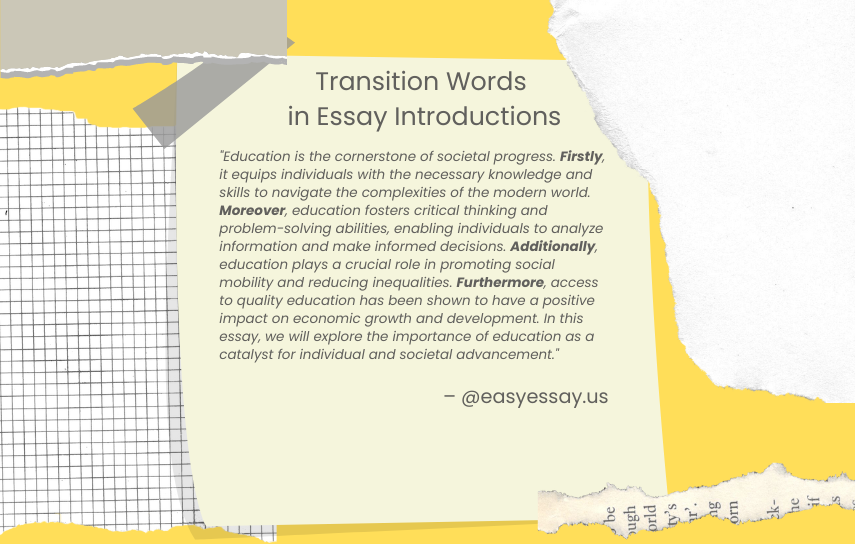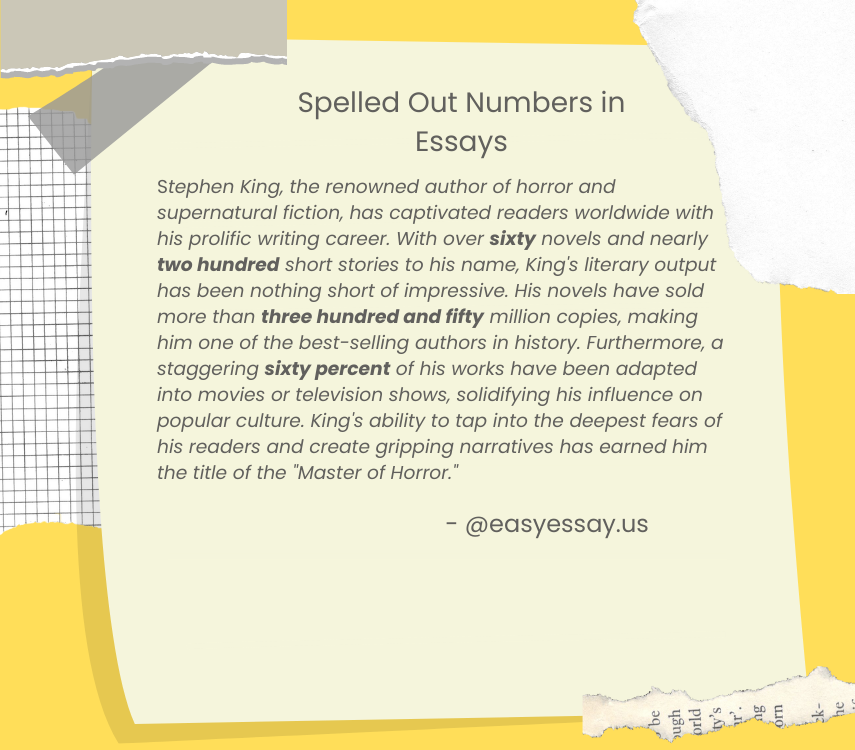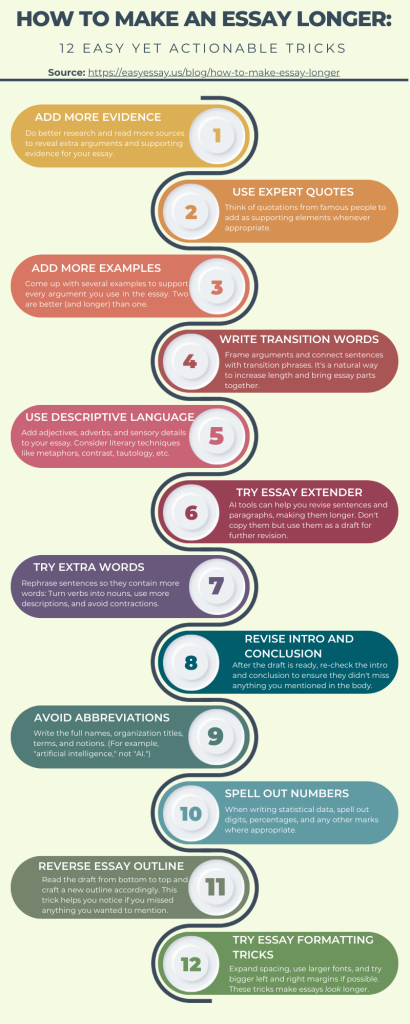Whether a college student or a content writer, you’ve been there many times:
You write a paper. It looks like you’ve said everything already. But it still doesn’t reach the required word count!
How to make essays longer? Are there any “legal” tricks that wouldn’t hurt the paper’s quality? I’ve gathered 12 hacks to influence the length of your writing work.
Ready to try?
3 Ways to Make an Essay Longer
First, the question:
Why make an essay longer? Why does a word count matter, after all?
For college papers, this component is critical. It shows instructors that you read the prompt’s requirements and can fulfill them. Also, it encourages you to do more profound research on the topic and find extra arguments for a paper.
The core tactics for essay lengthening are three:
- Write more words.
- Make paragraphs longer.
- Add more info to your work.
How to Make Essays Longer with Words
The most natural way to lengthen an essay is to add extra words. It can be transition words that link ideas. Also, you can spell out numbers: This trick helps reach a page length.
Besides, you can use descriptive language in essays. Add more adjectives and adverbs to specify your arguments. Or spell out abbreviations if appropriate.
How to Make a Paragraph Longer
You can expand essay paragraphs by adding more examples and expert quotes. It will make your work not only longer but also stronger:
Quotes and examples are powerful instruments to support arguments. When the draft is ready, revise the introductory and concluding paragraphs. Check if there’s something to add to expand your points for readers.
Another trick is paragraph formatting.
Try expanding spaces between characters, raising the font size, or changing the font. It doesn’t add more words to essays, but these little tricks make your work visually longer.
How to Lengthen Essays with Deeper Research
You won’t bother about the required word count if you have enough information on the topic. Pay attention to your academic research (1):
- Examine the subject inside and out.
- Find more details, arguments, and counterarguments.
- Check more resources to reveal extra evidence to mention in your work.
- Think of several, not only one, examples to support your claim.
The more information you have, the longer your final draft will be. But ensure it’s relevant to the topic and it brings value to your message. Please don’t add extra info “just in case,” and don’t repeat the same facts throughout all paragraphs.
How to Lengthen an Essay: 12 Easy Hacks
And now, to practice:
Here are your actionable tricks on how to write a longer essay.
1 — Add More Evidence
Do better research to find more information on your paper’s topic. Read more sources to get extra arguments and counterarguments for your work.
Supporting evidence will make your essay longer and more professional. You’ll share statements, not vague or generic sentences for nothing but word count.
2 — Use Expert Quotes
Think of quotations from famous people or experts in your essay’s topic. Add them as supporting elements whenever appropriate.
Quotes are also a good writing hook to start your essay. The advice I would give you here:
Please don’t take the very first quote you find online. Most are overused, making teachers roll their eyes. Find sayings that are relevant to the topic yet surprising to the audience. Reveal new quotations to the readers.
3 — Add More Examples
Look at the arguments you use in an essay. Do you back them up with examples? Not only is it an opportunity to lengthen your work, but it’s also an instrument to prove your claim is accurate.
Together with quotes, examples work as evidence to make your work A-worthy.
4 — Remember About Transition Words
Transition words are those framing your arguments and connecting sentences within a paper. College students place them between essay sections or within a paragraph to tie sentences into a logical flow.
Example:

It’s a natural way to increase an essay’s length and tie its parts.
5 — Use Descriptive Language
This trick will strengthen your personal, descriptive, and narrative essays. Don’t hesitate to use adjectives, different sensory details, and adverbs. You’ll kill two birds with one stone:
Make your essay longer and more compelling.
You can try different writing techniques here: metaphors, repetitions, contrast, tautology, etc.
6 — Try Essay Extender
An essay extender is a tool for generating new content by breaking down the existing one. You give it a text, and it divides it into smaller units: paragraphs or sentences. Then, it takes those units, examines their context, and generates new text blocks relevant to the original story.
AI tools like ChatGPT or Jasper work like this. Using them, remember about academic integrity: Don’t copy their texts word for word. Consider their results as an example, and revise your essay accordingly.
7 — Try Extra Words
You can rephrase sentences so they will contain more words. For example, try turning verbs into nouns: “I’ve come to the conclusion that” is longer than “I concluded.”
Other tricks:
- Add more details and descriptions. Don’t write, “We had fun,” but try, “My friends and I have so much fun walking in the park and seeing cute squirrels in the trees.”
- Use “to be” instead of -ly adverbs. Write, “I am an active listener” instead of “I listen actively.”
Don’t use contractions:
Change “I’m,” “doesn’t,” or “won’t” for “I am,” “does not,” and “will not.” Thus, you’ll have more words to make your essay longer.
8 — Revise the Introduction and Conclusion
After the final draft is ready, recheck its introductory and concluding paragraphs.
Ideas tend to evolve while you’re writing. And it may appear that your introduction missed some when you started to write. Your thesis may omit an argument, or you may want to change the writing hook or topic background.
The same is for the conclusion. Check again to ensure it sounds final and sums up everything you told in the essay. Think like a reader: Does this concluding paragraph leave you satisfied?
9 — Avoid Abbreviations
This one is short:
If using some abbreviations in essays, try to spell them out. Write “American Center for Psychiatry and Neurology,” not “ACPN.” Use “intended-based networking,” not “IBN,” etc.
10 — Spell Out Numbers
Statistical data strengthen your essay claims. So, numbers and percentages are great ways to support the argument with evidence. Why not spell them out instead of using digits or marks?
Agree that “one hundred and forty-four” looks (and is!) longer than 144. The same goes for “percent” instead of “%.” Use this trick whenever appropriate. (Check the formatting guidelines to see if you can write them like this.)

11 — Reverse Your Essay Outline
Once your draft is ready, read it from bottom to top. Reorganize the outline accordingly: Create a new one based on what you already have. It will help you see which sections are possible to develop.
For example, you can see that one paragraph is heavy and introduces several ideas. If so, break it into several new sections and expand each with extra arguments, facts, and supporting evidence.
12 — Try Essay Formatting Tricks
And last, here go a few paragraph formatting tricks that make your essay look longer. They don’t add more words but help you reach the required page length.
- Expand the spacing between words and characters.
- Think of a larger spacing between lines: 2.5 spacing instead of double isn’t really noticeable.
- Change the font: 12.5pt looks much like 12pt, don’t you agree?
- Try making the left and right margins bigger, if possible.
Sure thing, these are gimmicks that look like “cheating.” I don’t encourage you to use all for every essay you write. Such formatting tricks are more for desperate students who try everything yet can’t get the required page length.
Instead, you can focus on the proper paragraph structure. Ensure each section has a topic sentence, supporting evidence, and a transition. By adding these elements whenever they’re absent, you can influence the essay length.
Words to Make Your Essay Longer
These universal words most students use in papers have lengthy versions. While pointless wordiness is not okay to overuse in academic writing, you can try some now and then.
| Short version: | Longer version with the same meaning: |
| like | along the lines of, in the nature of |
| in fact | as a matter of fact |
| always | at all times |
| now | at the present time, at this point of time |
| because | because of the fact that, due to the fact that, for the reason that, in light of the fact that |
| finally | in the final analysis |
| most | the majority of |
| although | in spite of the fact that |
| for | for the purpose of, with reference to |
| of, on | in regards to, with reference to |
| to | in order to |
| if | in the event that |
| about | with reference to, in the neighborhood of, in regards to |
| when | on the occasion of |
| until | until such time as |
| twice | on two separate occasions |
Attention! Don’t place longer versions in every sentence and paragraph! You risk turning your essay into balderdash. Know your limit. Use lengthy expressions where they fit into the context.
Frequently Asked Questions
How long should an essay be?
It depends on your prompt’s requirements and the type of essay you write. An average college essay is between 650 and 1,200 words, though some teachers are okay with 500-600.
How to make an essay look longer?
Three ways: longer or extra words, expanded paragraphs, and precise research. Add more details to descriptions, consider examples, and add quotations. Choose longer phrases and place transition words between sentences and paragraphs. You may also try formatting tricks like bigger fonts or extra spacing between words and characters, but please don’t take them for granted.
How to make sentences longer for an essay?
You can use longer synonyms for common words. For example, write “in the final analysis” instead of “finally.” Also, feel free to use descriptive adjectives or adverbs, turn verbs into nouns, and add more details to the arguments in your sentences.
How to make because longer in an essay?
There are several synonyms of “because” to use in your essays for longer sentences. Write phrases like “because of the fact that,” “due to the fact that,” “for the reason that,” or “in light of the fact that.” Know your limit! When overused, such phrases make papers sound unprofessional.
How to make my essay longer in the right way?
Don’t focus on wordy sentences, transitions, or complex phrases. Instead, take time to research the topic. Find extra arguments, statistical data, and other elements that will make your essay stronger, not longer. When structuring paragraphs, ensure to include supporting evidence (2). Add the information, not vague phrases for the sake of word count.
Make an Essay Longer: Takeaways
Now that you know how to make papers longer, choose the proper methods when expanding your essays:
- Focus on extra arguments and evidence.
- Avoid repetitions.
- Use descriptive language, remember synonyms, and spell out numbers/abbreviations when appropriate.
Your task is to make essays stronger, not just longer. While sometimes it may be okay to “cheat” with lengthy words or sentences, it’s not the rule to take for granted. Arguments, examples, and informative quality matter and bring you high grades.
References:

I like your blog so much, saved to bookmarks.